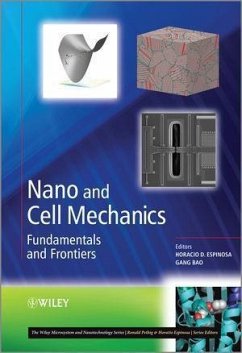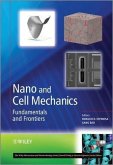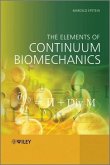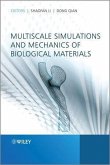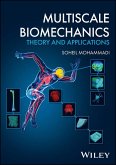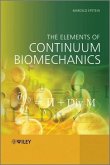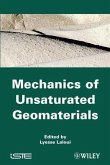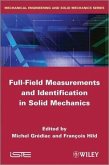

Alle Infos zum eBook verschenken

- Format: ePub
- Merkliste
- Auf die Merkliste
- Bewerten Bewerten
- Teilen
- Produkt teilen
- Produkterinnerung
- Produkterinnerung

Hier können Sie sich einloggen

Bitte loggen Sie sich zunächst in Ihr Kundenkonto ein oder registrieren Sie sich bei bücher.de, um das eBook-Abo tolino select nutzen zu können.
Research in nano and cell mechanics has received much attention from the scientific community as a result of society needs and government initiatives to accelerate developments in materials, manufacturing, electronics, medicine and healthcare, energy, and the environment. Engineers and scientists are currently engaging in increasingly complex scientific problems that require interdisciplinary approaches. In this regard, studies in this field draw from fundamentals in atomistic scale phenomena, biology, statistical and continuum mechanics, and multiscale modeling and experimentation. As a…mehr
- Geräte: eReader
- mit Kopierschutz
- eBook Hilfe
- Größe: 25.13MB
![Nano and Cell Mechanics (eBook, PDF) Nano and Cell Mechanics (eBook, PDF)]() Horacio D. EspinosaNano and Cell Mechanics (eBook, PDF)117,99 €
Horacio D. EspinosaNano and Cell Mechanics (eBook, PDF)117,99 €![The Elements of Continuum Biomechanics (eBook, ePUB) The Elements of Continuum Biomechanics (eBook, ePUB)]() Marcelo EpsteinThe Elements of Continuum Biomechanics (eBook, ePUB)95,99 €
Marcelo EpsteinThe Elements of Continuum Biomechanics (eBook, ePUB)95,99 €![Multiscale Simulations and Mechanics of Biological Materials (eBook, ePUB) Multiscale Simulations and Mechanics of Biological Materials (eBook, ePUB)]() Multiscale Simulations and Mechanics of Biological Materials (eBook, ePUB)121,99 €
Multiscale Simulations and Mechanics of Biological Materials (eBook, ePUB)121,99 €![Multiscale Biomechanics (eBook, ePUB) Multiscale Biomechanics (eBook, ePUB)]() Soheil MohammadiMultiscale Biomechanics (eBook, ePUB)95,99 €
Soheil MohammadiMultiscale Biomechanics (eBook, ePUB)95,99 €![The Elements of Continuum Biomechanics (eBook, PDF) The Elements of Continuum Biomechanics (eBook, PDF)]() Marcelo EpsteinThe Elements of Continuum Biomechanics (eBook, PDF)95,99 €
Marcelo EpsteinThe Elements of Continuum Biomechanics (eBook, PDF)95,99 €![Mechanics of Unsaturated Geomaterials (eBook, ePUB) Mechanics of Unsaturated Geomaterials (eBook, ePUB)]() Mechanics of Unsaturated Geomaterials (eBook, ePUB)160,99 €
Mechanics of Unsaturated Geomaterials (eBook, ePUB)160,99 €![Full-Field Measurements and Identification in Solid Mechanics (eBook, ePUB) Full-Field Measurements and Identification in Solid Mechanics (eBook, ePUB)]() Full-Field Measurements and Identification in Solid Mechanics (eBook, ePUB)181,99 €
Full-Field Measurements and Identification in Solid Mechanics (eBook, ePUB)181,99 €-
-
-
Dieser Download kann aus rechtlichen Gründen nur mit Rechnungsadresse in A, B, BG, CY, CZ, D, DK, EW, E, FIN, F, GR, HR, H, IRL, I, LT, L, LR, M, NL, PL, P, R, S, SLO, SK ausgeliefert werden.
- Produktdetails
- Verlag: John Wiley & Sons
- Seitenzahl: 520
- Erscheinungstermin: 11. Dezember 2012
- Englisch
- ISBN-13: 9781118482599
- Artikelnr.: 37345963
- Verlag: John Wiley & Sons
- Seitenzahl: 520
- Erscheinungstermin: 11. Dezember 2012
- Englisch
- ISBN-13: 9781118482599
- Artikelnr.: 37345963
xxi Preface xxiii Part One BIOLOGICAL PHENOMENA 1 Cell-Receptor
Interactions 3 David Lepzelter and Muhammad Zaman 1.1 Introduction 3 1.2
Mechanics of Integrins 4 1.3 Two-Dimensional Adhesion 7 1.4 Two-Dimensional
Motility 9 1.5 Three-Dimensional Adhesion 11 1.6 Three-Dimensional Motility
12 1.7 Apoptosis and Survival Signaling 13 1.8 Cell Differentiation
Signaling 13 1.9 Conclusions 14 References 15 2 Regulatory Mechanisms of
Kinesin and Myosin Motor Proteins: Inspiration for Improved Control of
Nanomachines 19 Sarah Rice 2.1 Introduction 19 2.2 Generalized Mechanism of
Cytoskeletal Motors 19 2.3 Switch I: A Controller of Motor Protein and G
Protein Activation 21 2.4 Calcium-Binding Regulators of Myosins and
Kinesins 23 2.5 Phospho-Regulation of Kinesin and Myosin Motors 262.6
Cooperative Action of Kinesin and Myosin Motors as a "Regulator" 28 2.7
Conclusion 29 References 30 3 Neuromechanics: The Role of Tension in
Neuronal Growth and Memory 35 Wylie W. Ahmed, Jagannathan Rajagopalan,
Alireza Tofangchi, and Taher A. Saif 3.1 Introduction 35 3.2 Tension in
Neuronal Growth 41 3.3 Tension in Neuron Function 48 3.4 Modeling the
Mechanical Behavior of Axons 52 3.5 Outlook 58 References 58 Part Two
NANOSCALE PHENOMENA 4 Fundamentals of Roughness-Induced Superhydrophobicity
65 Neelesh A. Patankar 4.1 Background and Motivation 65 4.2 Thermodynamic
Analysis: Classical Problem (Hydrophobic to Superhydrophobic) 67 4.3
Thermodynamic Analysis: Classical Problem (Hydrophilic to Superhydrophobic)
84 4.4 Thermodynamic Analysis: Vapor Stabilization 86 4.5 Applications and
Future Challenges 90 Acknowledgments 91 References 91 5 Multiscale
Experimental Mechanics of Hierarchical Carbon-Based Materials 95 Horacio D.
Espinosa, Tobin Filleter, and Mohammad Naraghi 5.1 Introduction 95 5.2
Multiscale Experimental Tools 97 5.3 Hierarchical Carbon-Based Materials
106 5.4 Concluding Remarks 120 References 123 6 Mechanics of Nanotwinned
Hierarchical Metals 129 Xiaoyan Li and Huajian Gao 6.1 Introduction and
Overview 129 6.2 Microstructural Characterization and Mechanical Properties
of Nanotwinned Materials 134 6.3 Deformation Mechanisms in Nanotwinned
Metals 145 6.4 Concluding Remarks 156 References 157 7 Size-Dependent
Strength in Single-Crystalline Metallic Nanostructures 163 Julia R. Greer
7.1 Introduction 163 7.2 Background 164 7.3 Sample Fabrication 170 7.4
Uniaxial Deformation Experiments 175 7.5 Discussion and Outlook on
Size-Dependent Strength in Single-Crystalline Metals 178 7.6 Conclusions
and Outlook 184 References 185 Part Three EXPERIMENTATION 8 In-Situ TEM
Electromechanical Testing of Nanowires and Nanotubes 193 Horacio D.
Espinosa, Rodrigo A. Bernal, and Tobin Filleter 8.1 Introduction 193 8.2
In-Situ TEM Experimental Methods 197 8.3 Capabilities of In-Situ TEM
Applied to One-Dimensional Nanostructures 212 8.4 Summary and Outlook 220
Acknowledgments 221 References 221 9 Engineering Nano-Probes for Live-Cell
Imaging of Gene Expression 227 Gang Bao, Brian Wile, and Andrew Tsourkas
9.1 Introduction 227 9.2 Molecular Probes for RNA Detection 229 9.3 Probe
Design, Imaging, and Biological Issues 239 9.4 Delivery of Molecular
Beacons 244 9.5 Engineering Challenges and Future Directions 248
Acknowledgments 249 References 249 10 Towards High-Throughput Cell
Mechanics Assays for Research and Clinical Applications 255 David R. Myers,
Daniel A. Fletcher, and Wilbur A. Lam 10.1 Cell Mechanics Overview 255 10.2
Bulk Assays 262 10.3 Single-Cell Techniques 268 10.4 Existing
High-Throughput Cell Mechanical-Based Assays 274 10.5 Cell Mechanical
Properties and Diseases 280 References 284 11 Microfabricated Technologies
for Cell Mechanics Studies 293 Sri Ram K. Vedula, Man C. Leong, and Chwee
T. Lim 11.1 Introduction 293 11.2 Microfabrication Techniques 294 11.3
Applications to Cell Mechanics 298 11.4 Conclusions 307 References 307 Part
Four MODELING 12 Atomistic Reaction Pathway Sampling: The Nudged Elastic
BandMethod and Nanomechanics Applications 313 Ting Zhu, Ju Li, and Sidney
Yip 12.1 Introduction 313 12.2 The NEB Method for Stress-Driven Problems
315 12.3 Nanomechanics Case Studies 324 12.4 A Perspective on
Microstructure Evolution at Long Times 332 References 336 13 Mechanics of
Curvilinear Electronics 339 Shuodao Wang, Jianliang Xiao, Jizhou Song,
Yonggang Huang, and John A. Rogers 13.1 Introduction 339 13.2 Deformation
of Elastomeric Transfer Elements during Wrapping Processes 342 13.3
Buckling of Interconnect Bridges 347 13.4 Maximum Strain in the Circuit
Mesh 351 13.5 Concluding Remarks 355 Acknowledgments 355 References 355 14
Single-Molecule Pulling: Phenomenology and Interpretation 359 Ignacio
Franco, Mark A. Ratner, and George C. Schatz 14.1 Introduction 359 14.2
Force-Extension Behavior of Single Molecules 360 14.3 Single-Molecule
Thermodynamics 364 14.4 Modeling Single-Molecule Pulling Using Molecular
Dynamics 370 14.5 Interpretation of Pulling Phenomenology 376 14.6 Summary
384 Acknowledgments 385 References 385 15 Modeling and Simulation of
Hierarchical Protein Materials 389 Tristan Giesa, Graham Bratzel, and
Markus J. Buehler 15.1 Introduction 389 15.2 Computational and Theoretical
Tools 391 15.3 Case Studies 400 15.4 Discussion and Conclusion 406
Acknowledgments 406 References 406 16 Geometric Models of Protein
Secondary-Structure Formation 411 Hendrik Hansen-Goos and Seth Lichter 16.1
Introduction 411 16.2 Hydrophobic Effect 412 16.3 Prior Numerical and
Coarse-Grained Models 415 16.4 Geometry-Based Modeling: The Tube Model 416
16.5 Morphometric Approach to Solvation Effects 422 16.6 Discussion,
Conclusions, Future Work 429 Acknowledgments 433 References 433 17
Multiscale Modeling for the Vascular Transport of Nanoparticles 437 Shaolie
S. Hossain, Adrian M. Kopacz, Yongjie Zhang, Sei-Young Lee, Tae-Rin Lee,
Mauro Ferrari, Thomas J.R. Hughes, Wing Kam Liu, and Paolo Decuzzi 17.1
Introduction 437 17.2 Modeling the Dynamics of NPs in the Macrocirculation
438 17.3 Modeling the NP Dynamics in the Microcirculation 448 17.4
Conclusions 456 Acknowledgments 456 References 457 Index 461
xxi Preface xxiii Part One BIOLOGICAL PHENOMENA 1 Cell-Receptor
Interactions 3 David Lepzelter and Muhammad Zaman 1.1 Introduction 3 1.2
Mechanics of Integrins 4 1.3 Two-Dimensional Adhesion 7 1.4 Two-Dimensional
Motility 9 1.5 Three-Dimensional Adhesion 11 1.6 Three-Dimensional Motility
12 1.7 Apoptosis and Survival Signaling 13 1.8 Cell Differentiation
Signaling 13 1.9 Conclusions 14 References 15 2 Regulatory Mechanisms of
Kinesin and Myosin Motor Proteins: Inspiration for Improved Control of
Nanomachines 19 Sarah Rice 2.1 Introduction 19 2.2 Generalized Mechanism of
Cytoskeletal Motors 19 2.3 Switch I: A Controller of Motor Protein and G
Protein Activation 21 2.4 Calcium-Binding Regulators of Myosins and
Kinesins 23 2.5 Phospho-Regulation of Kinesin and Myosin Motors 262.6
Cooperative Action of Kinesin and Myosin Motors as a "Regulator" 28 2.7
Conclusion 29 References 30 3 Neuromechanics: The Role of Tension in
Neuronal Growth and Memory 35 Wylie W. Ahmed, Jagannathan Rajagopalan,
Alireza Tofangchi, and Taher A. Saif 3.1 Introduction 35 3.2 Tension in
Neuronal Growth 41 3.3 Tension in Neuron Function 48 3.4 Modeling the
Mechanical Behavior of Axons 52 3.5 Outlook 58 References 58 Part Two
NANOSCALE PHENOMENA 4 Fundamentals of Roughness-Induced Superhydrophobicity
65 Neelesh A. Patankar 4.1 Background and Motivation 65 4.2 Thermodynamic
Analysis: Classical Problem (Hydrophobic to Superhydrophobic) 67 4.3
Thermodynamic Analysis: Classical Problem (Hydrophilic to Superhydrophobic)
84 4.4 Thermodynamic Analysis: Vapor Stabilization 86 4.5 Applications and
Future Challenges 90 Acknowledgments 91 References 91 5 Multiscale
Experimental Mechanics of Hierarchical Carbon-Based Materials 95 Horacio D.
Espinosa, Tobin Filleter, and Mohammad Naraghi 5.1 Introduction 95 5.2
Multiscale Experimental Tools 97 5.3 Hierarchical Carbon-Based Materials
106 5.4 Concluding Remarks 120 References 123 6 Mechanics of Nanotwinned
Hierarchical Metals 129 Xiaoyan Li and Huajian Gao 6.1 Introduction and
Overview 129 6.2 Microstructural Characterization and Mechanical Properties
of Nanotwinned Materials 134 6.3 Deformation Mechanisms in Nanotwinned
Metals 145 6.4 Concluding Remarks 156 References 157 7 Size-Dependent
Strength in Single-Crystalline Metallic Nanostructures 163 Julia R. Greer
7.1 Introduction 163 7.2 Background 164 7.3 Sample Fabrication 170 7.4
Uniaxial Deformation Experiments 175 7.5 Discussion and Outlook on
Size-Dependent Strength in Single-Crystalline Metals 178 7.6 Conclusions
and Outlook 184 References 185 Part Three EXPERIMENTATION 8 In-Situ TEM
Electromechanical Testing of Nanowires and Nanotubes 193 Horacio D.
Espinosa, Rodrigo A. Bernal, and Tobin Filleter 8.1 Introduction 193 8.2
In-Situ TEM Experimental Methods 197 8.3 Capabilities of In-Situ TEM
Applied to One-Dimensional Nanostructures 212 8.4 Summary and Outlook 220
Acknowledgments 221 References 221 9 Engineering Nano-Probes for Live-Cell
Imaging of Gene Expression 227 Gang Bao, Brian Wile, and Andrew Tsourkas
9.1 Introduction 227 9.2 Molecular Probes for RNA Detection 229 9.3 Probe
Design, Imaging, and Biological Issues 239 9.4 Delivery of Molecular
Beacons 244 9.5 Engineering Challenges and Future Directions 248
Acknowledgments 249 References 249 10 Towards High-Throughput Cell
Mechanics Assays for Research and Clinical Applications 255 David R. Myers,
Daniel A. Fletcher, and Wilbur A. Lam 10.1 Cell Mechanics Overview 255 10.2
Bulk Assays 262 10.3 Single-Cell Techniques 268 10.4 Existing
High-Throughput Cell Mechanical-Based Assays 274 10.5 Cell Mechanical
Properties and Diseases 280 References 284 11 Microfabricated Technologies
for Cell Mechanics Studies 293 Sri Ram K. Vedula, Man C. Leong, and Chwee
T. Lim 11.1 Introduction 293 11.2 Microfabrication Techniques 294 11.3
Applications to Cell Mechanics 298 11.4 Conclusions 307 References 307 Part
Four MODELING 12 Atomistic Reaction Pathway Sampling: The Nudged Elastic
BandMethod and Nanomechanics Applications 313 Ting Zhu, Ju Li, and Sidney
Yip 12.1 Introduction 313 12.2 The NEB Method for Stress-Driven Problems
315 12.3 Nanomechanics Case Studies 324 12.4 A Perspective on
Microstructure Evolution at Long Times 332 References 336 13 Mechanics of
Curvilinear Electronics 339 Shuodao Wang, Jianliang Xiao, Jizhou Song,
Yonggang Huang, and John A. Rogers 13.1 Introduction 339 13.2 Deformation
of Elastomeric Transfer Elements during Wrapping Processes 342 13.3
Buckling of Interconnect Bridges 347 13.4 Maximum Strain in the Circuit
Mesh 351 13.5 Concluding Remarks 355 Acknowledgments 355 References 355 14
Single-Molecule Pulling: Phenomenology and Interpretation 359 Ignacio
Franco, Mark A. Ratner, and George C. Schatz 14.1 Introduction 359 14.2
Force-Extension Behavior of Single Molecules 360 14.3 Single-Molecule
Thermodynamics 364 14.4 Modeling Single-Molecule Pulling Using Molecular
Dynamics 370 14.5 Interpretation of Pulling Phenomenology 376 14.6 Summary
384 Acknowledgments 385 References 385 15 Modeling and Simulation of
Hierarchical Protein Materials 389 Tristan Giesa, Graham Bratzel, and
Markus J. Buehler 15.1 Introduction 389 15.2 Computational and Theoretical
Tools 391 15.3 Case Studies 400 15.4 Discussion and Conclusion 406
Acknowledgments 406 References 406 16 Geometric Models of Protein
Secondary-Structure Formation 411 Hendrik Hansen-Goos and Seth Lichter 16.1
Introduction 411 16.2 Hydrophobic Effect 412 16.3 Prior Numerical and
Coarse-Grained Models 415 16.4 Geometry-Based Modeling: The Tube Model 416
16.5 Morphometric Approach to Solvation Effects 422 16.6 Discussion,
Conclusions, Future Work 429 Acknowledgments 433 References 433 17
Multiscale Modeling for the Vascular Transport of Nanoparticles 437 Shaolie
S. Hossain, Adrian M. Kopacz, Yongjie Zhang, Sei-Young Lee, Tae-Rin Lee,
Mauro Ferrari, Thomas J.R. Hughes, Wing Kam Liu, and Paolo Decuzzi 17.1
Introduction 437 17.2 Modeling the Dynamics of NPs in the Macrocirculation
438 17.3 Modeling the NP Dynamics in the Microcirculation 448 17.4
Conclusions 456 Acknowledgments 456 References 457 Index 461
